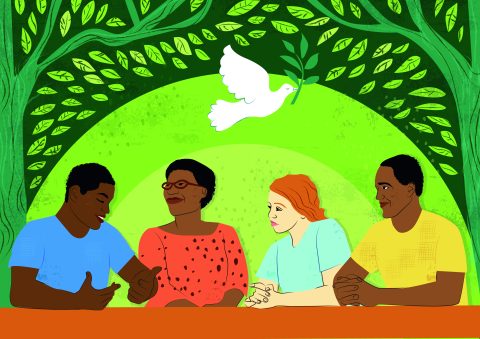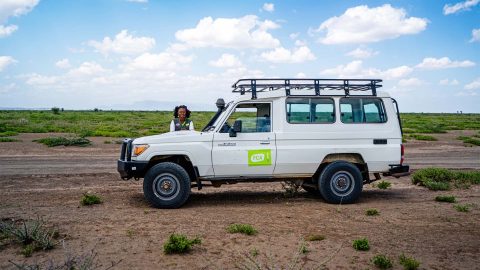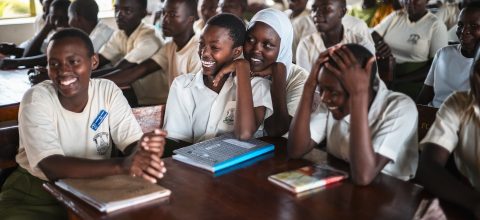A father’s legacy, a daughter’s future
Emery Shwapa Kitera, 44, is a father of five daughters and former teacher, who resolves internal disputes in one of Kenya’s largest refugee areas. Emery knows that girls in particular need a parent who will keep them in school at all costs.
Text & photos: Björn Udd
Interviews: Björn Udd, Mark Kuya and Muema Kawisia Molline
EMERY SHWAPA KITERA is the father of five daughters. According to Kitera, fathers play an important role in helping their daughters get ahead in life. As we interview him at the family’s small dwelling in the Kalobeyei refugee settlement, he holds his five-month-old daughter, Asoka Muhinde, while explaining why education for his daughters is the most important part of passing on his legacy as a father.
“The most important thing a father can teach his daughters is the importance of education. An educated person can fend for themselves, leave the refugee area, and find a good job.
“I grew up in the Democratic Republic of Congo. I was able to attend school and graduated as a teacher in 2012. I taught science and psychology to high school students in my home region of South Kivu, but about eight years ago, my family and I were forced to flee the violence and fighting.
“Our escape from Congo was difficult. We traveled by bus first to Burundi, then to Rwanda, and finally through Uganda to northern Kenya. Now we live in the Kalobeyei refugee camp.”
“My family consists of my wife, five daughters, my late brother’s wife, and their children. My eldest daughter is 14 and my youngest is five months old.
“Although life in Kenya is tough, and even tougher now that all the organizations and donors have cut back, I am grateful that my family can live in peace. In Congo, the conflict has raged on for 29 years with almost no respite. I am glad that my family does not have to go through that.”
‘All the money I earn goes on feeding my family’
“TEACHER. That is my identity and my education, even though I have not been able to continue my work in Kenya. I speak many languages, but unfortunately not English well enough to teach in English.
“There are English courses for refugees in Kalobeyei, but I never had time to attend one. When we came here as refugees, it was much more important to earn enough money to ensure that my family would be well taken care of.
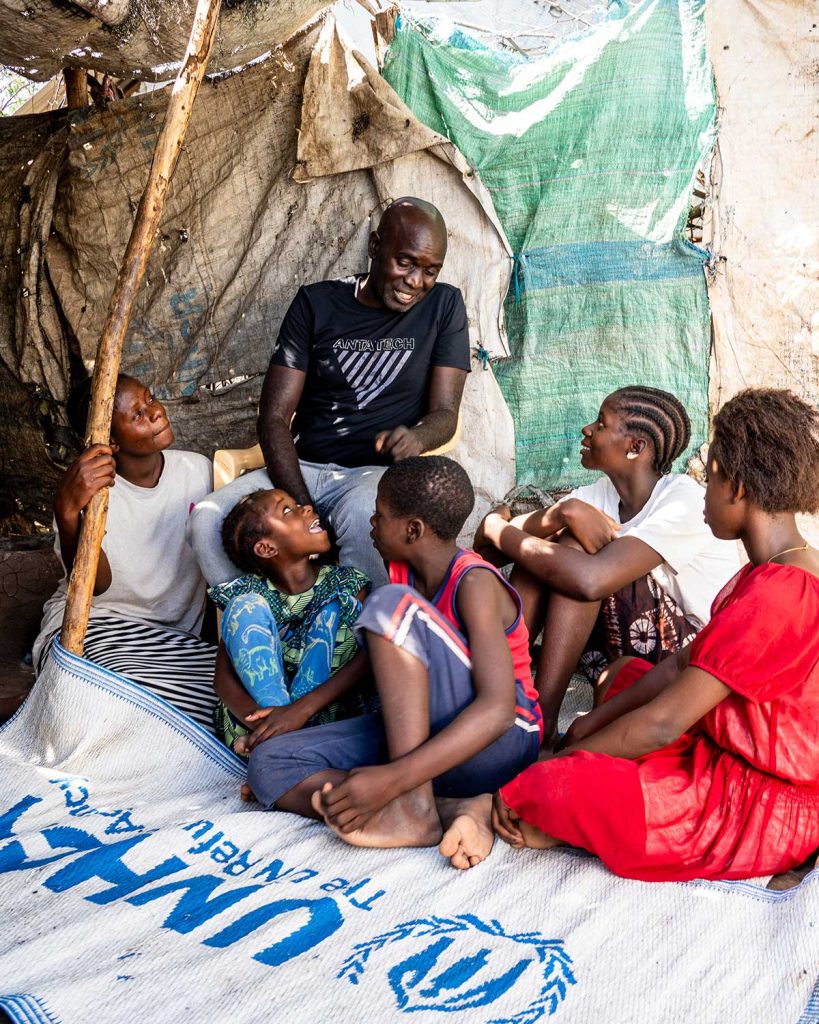
“Although my English isn’t very good, I speak several other languages. For example, I speak Swahili and French. Thanks to my language skills, I got a job as a security guard in a refugee area. My job involves resolving disputes, investigating thefts, and dealing with vandalism.
“I do my job well. Thanks to my language skills, I can act as a mediator in many disputes. Sometimes, however, the disputes are too difficult for us security guards to resolve, and we refer the cases to the police. I also get paid. Before the cuts, I earned 7,000 Kenyan shillings a month (about 50 EUR). I used the money mainly to buy school supplies and school uniforms for my children. After the cuts, my salary was almost halved and the food rations we received as aid were reduced. Because of the cuts, all the money I earn now goes to feeding my family.
“However, I want to support my children’s education as much as possible. My three oldest children attend a primary school called Bright, which is supported by Finn Church Aid, near our home.”
‘Since the cuts, there are too few teachers’
“WHY IS IT important to me that my children get an education despite our difficult financial situation? Because education is the best way out of the circumstances my family has found itself in as refugees.
“I hope that one day my daughters will be able to finish school. I dream that they will be able to leave the refugee camp and find work, for example, in Kenya’s capital Nairobi or even abroad.
“I want my daughters to be independent and have hope for the future. I want them to be able to live a normal life with their families.
“Since I have a background in education, I am also the vice-chair of my children’s school board. As members of the board, we try to identify the most vulnerable students so that we can support them with things like school uniforms and learning materials. We try to reach out to school dropouts and get them back to school. We also talk to donors and try to get extra funding for the school.
“I also conduct inspections. I make sure that school meals are available and that teachers are actually at school teaching. Monitoring teachers’ working hours may sound unbelievable, but the truth is that teachers with a refugee background in particular are paid very little. This makes them prone to taking on other jobs.
“I value the quality of education at my children’s school. There are enough classrooms, but after the cuts, there are too few teachers.”
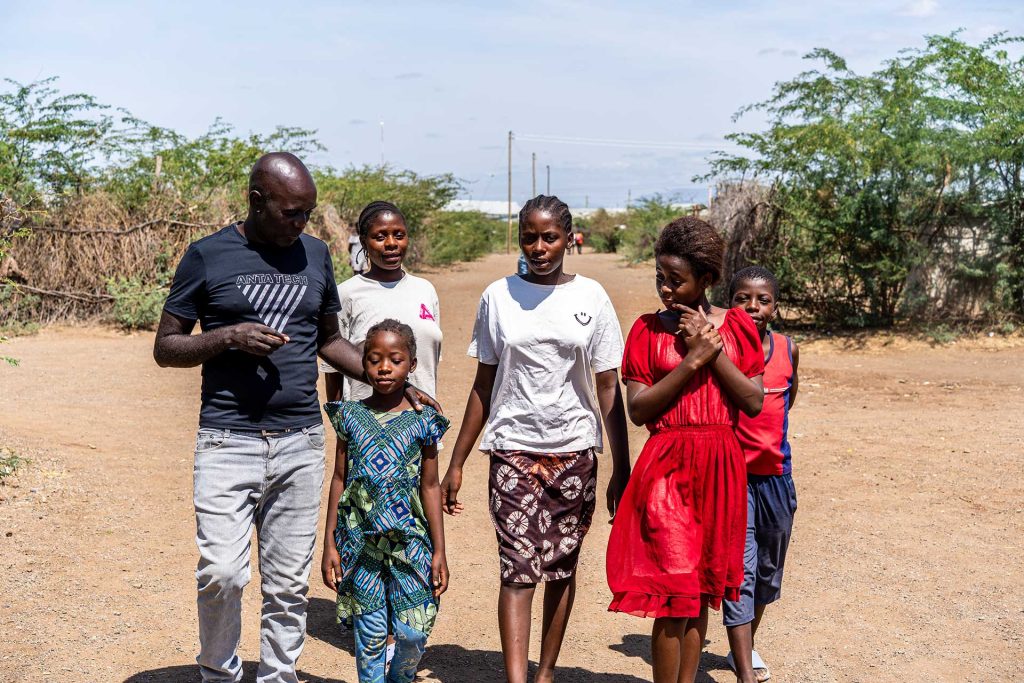
‘All I can do is give them good advice and pray that they listen’
“CHILDREN NEED a mother or father. Someone who takes care of them. Someone who tells them they have to go to school.
“I notice this because I regularly deal with school dropouts and investigate crimes. In our community, we try to take care of children who have arrived alone, but it is not easy. Many children who live alone have to start working at a very young age and therefore do not attend school.
“Those who have parents are fortunate. Parents can give their children guidance in life and help them avoid problems.
“As parents, we can ensure that our children become good members of society and not, for example, criminals. As a father, I try to instill in my daughters in particular the idea that they must finish their education before doing anything else in life.
“I encourage my daughters to attend school partly because inactivity leads young people into trouble. Teenage pregnancies and child marriages are major problems here, which I want them to avoid. Usually, if a girl becomes pregnant, she drops out of school and never returns. If they have meaningful things to do every day, it is easier for children to stay on the right track.
“In the end, however, all I can do is give them good advice and pray that they listen.
‘It feels unsafe here’
HERE IN KALOBEYEI, things are currently unsettled due to the cuts. Crime has increased as there is less food available. Previously, we looked out for each other with our neighbors. Now many neighbors, especially those who originally came from South Sudan, have returned to their homes despite the fact that conditions there are also dangerous.
It feels unsafe here when there are no longer familiar faces around to look after us. As a father, I am afraid of how this increasingly dangerous life will affect my daughters.
I try to spend time with my children, especially on weekends when I’m not working and they’re not at school. I watch as they do their chores, cook, and wash the dishes. Sometimes I gather them around me and tell them stories. Most recently, I told them an instructive story about a man who became an alcoholic. He made poor decisions in his life and ultimately disgraced himself.
Sometimes we go for walks together in our neighborhood. During our walks, I talk to my daughters about staying on the right path. My girls really enjoy our walks because they give them a little bit of freedom.”
About Emery Shwapa Kitera
- Father of five girls. He also takes care of his late brother’s wife and five children.
- Works as a security guard.
- Emery’s school-aged children attend FCA-supported schools in Kalobeyei. Emery serves as the chair of the board.
- He taught psychology and science to high school students in his hometown of Uvira.
- He fled with his family from the Democratic Republic of Congo to Kenya in 2017.
- He lives in a refugee camp in Kalobeyei.
- He enjoys watching soccer, especially the English Premier League and the French League.
—
You can support girls stay in school and fulfil their right to education. Donate here.
